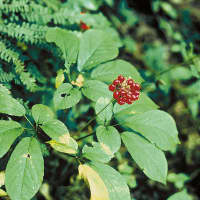Ginseng is a perennial plant that grows in the mountains of Eastern Asia.
Composition
Most of the biological activities of ginseng are derived from its main constituents, ginsenosides.[1]
Ginsenosides or panaxosides are a class of natural steroid glycosides and triterpene saponins.
- Compounds in this family are found almost exclusively in the plant genus Panax.
Healing Properties
Adaptogen
Panax ginseng exhibits adaptogenic properties related to the promotion of homeostasis and strengthening of systems impaired by stress.[2]
Exercise
Ginseng can be used to improve physical performance.[2:1]
Ginseng may be used to minimize the stress promoted by the practice of physical exercises.[2:2]
Muscle Health
Ginseng produced a significant reduction in the levels of creatine phosphokinase (CPK) and lactic dehydrogenase (LDH) after physical stress.[2:3]
- CPK and LDH are associated with muscle tissue breakdown.
Anti-Cancer
Ginsenoside has been shown to exhibit anticancer activity in in vivo models.[3]
Antimetastatic
Cardiovascular Health (Heart Health)
Disease / Symptom Treatment
Heart Disease
Myocardial ischemia/reperfusion
Ginsenoside Rg3, a ginsenoside found in Panax ginseng, produced significant improvement in cardiac function and decreased the levels of LDH and CPK, as well as improvement in the size of the myocardial infarct.[2:4]
Cancer
Lung Cancer
Ginsenosides Rk1 and Rg5 are promising drugs for the treatmentNon-small cell lung carcinoma (NSCLC).[3:1]
Title: Role of ginsenosides, the main active components of Panax ginseng, in inflammatory responses and diseases
Publication: Journal of Ginseng Research
Date: August 2016
Study Type: Review
Author(s): Ji Hye Kim, Young-Su Yi, Mi-Yeon Kim, and Jae Youl Cho
Institutions: Cheongju University, Cheongju, Republic of Korea; Sungkyunkwan University, Suwon, Korea; Soongsil University, Seoul, Republic of Korea
Copy: archive, archive-mirror ↩︎Title: Effects of Panax ginseng on the Metabolic Parameters of Rats Submitted to Swimming
Publication: Journal of Medicinal Food
Date: October 2019
Study Type: Animal Study: In Vitro - In Vivo, Review
Author(s): Victor Myung Joon Bang, Ana Luisa de Carvalho Aranão, Bruna Zampieri Nogueira, Adriano Cressoni Araújo, Patricia Cincotto dos Santos Bueno, Sandra Maria Barbalho, Maricelma da Silva Soares de Souza, and Elen Landgraf Guiguer
Institutions: University of Marılia (UNIMAR), Marılia–Brazil, Brazil; Faculty of Food Technology of Marılia, Marı´lia, Sao Paulo–Brazil
Copy: archive, archive-mirror ↩︎ ↩︎ ↩︎ ↩︎ ↩︎Title: Ginsenosides Rk1 and Rg5 inhibit transforming growth factor-β1-induced epithelial-mesenchymal transition and suppress migration, invasion, anoikis resistance, and development of stem-like features in lung cancer
Publication: Journal of Ginseng Research
Date: January 2021
Study Type: Human Study: In Vitro
Author(s): Hyunhee Kim, Pilju Choi, Taejung Kim, Youngseok Kim, Bong Geun Song, Young-Tae Park, Seon-Jun Choi, Cheol Hee Yoon, Won-Chul Lim, Hyeonseok Ko, Jungyeob Ham
Institutions: University of Ulsan College of Medicine, Seoul, Republic of Korea; Korea Institute of Science and Technology (KIST), Gangneung, Republic of Korea; Korea Food Research Institute, Wanju, Republic of Korea; Asan Institute for Life Sciences, Seoul, Republic of Korea; University of Science and Technology (UST), Seoul, Republic of Korea
Copy: archive, archive-mirror ↩︎ ↩︎
